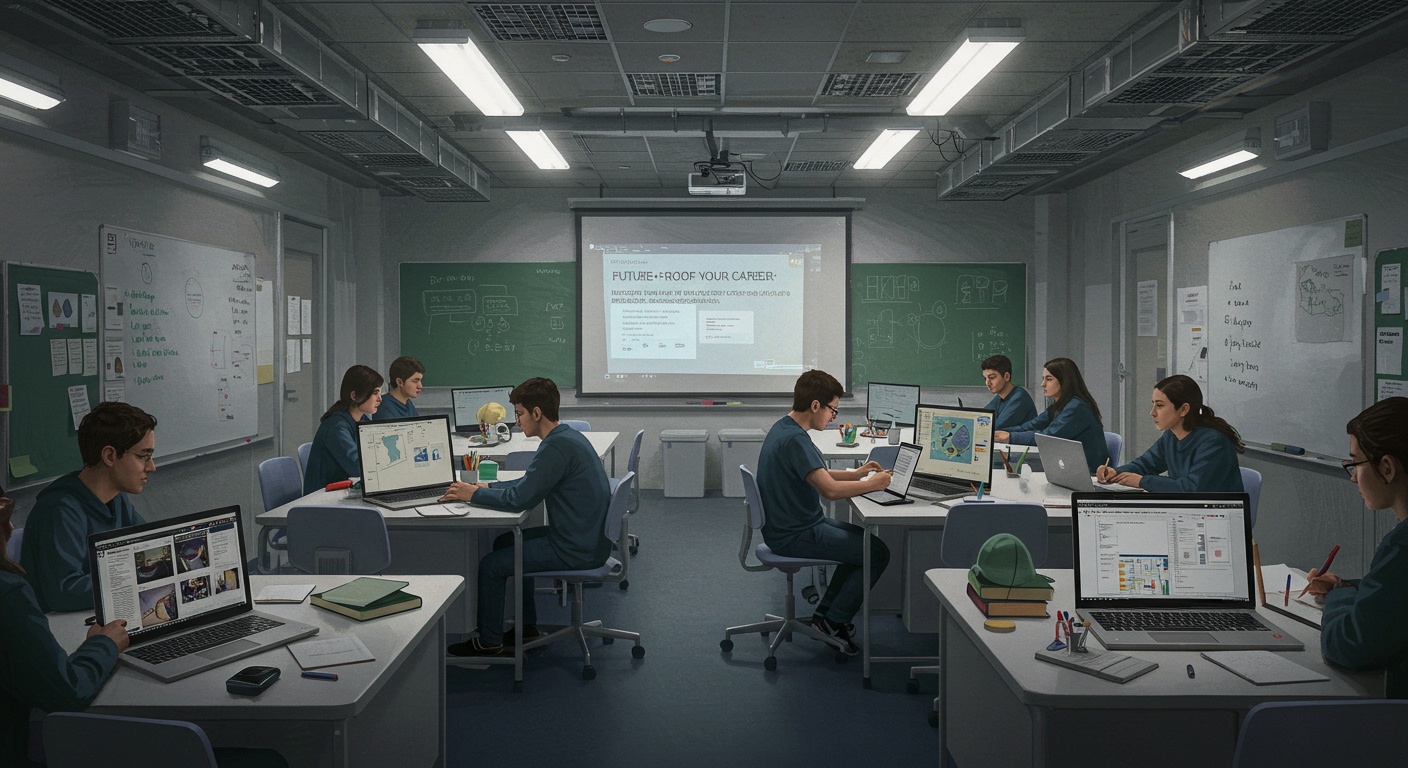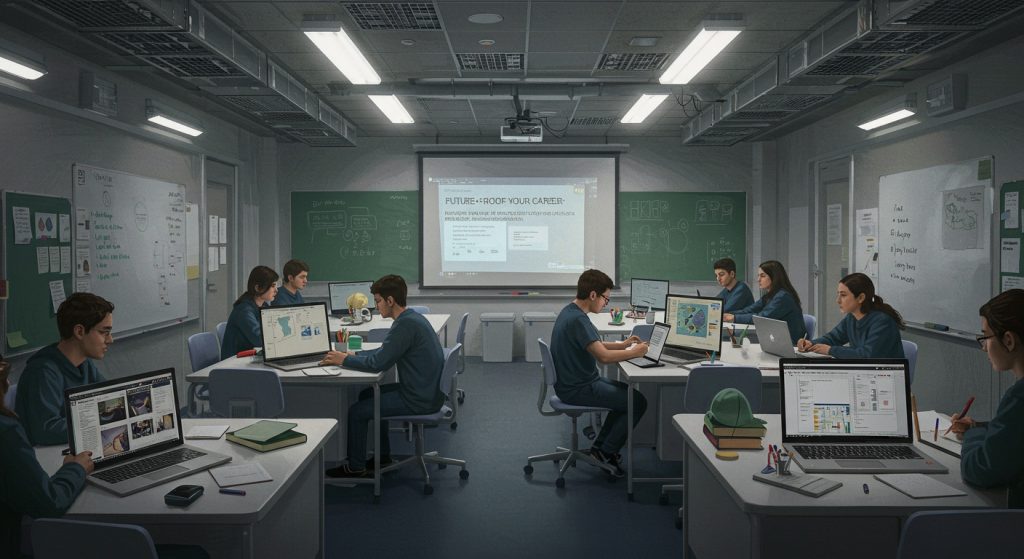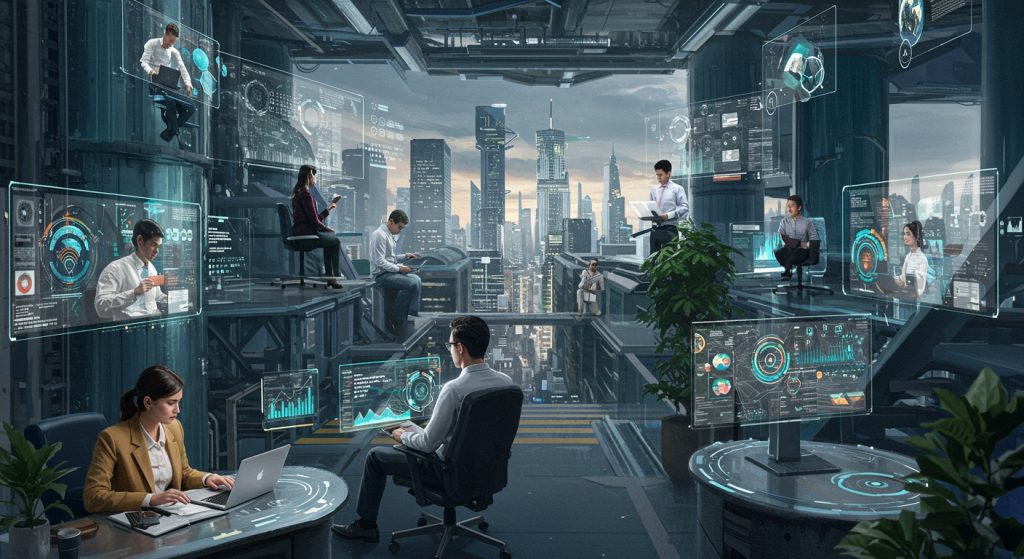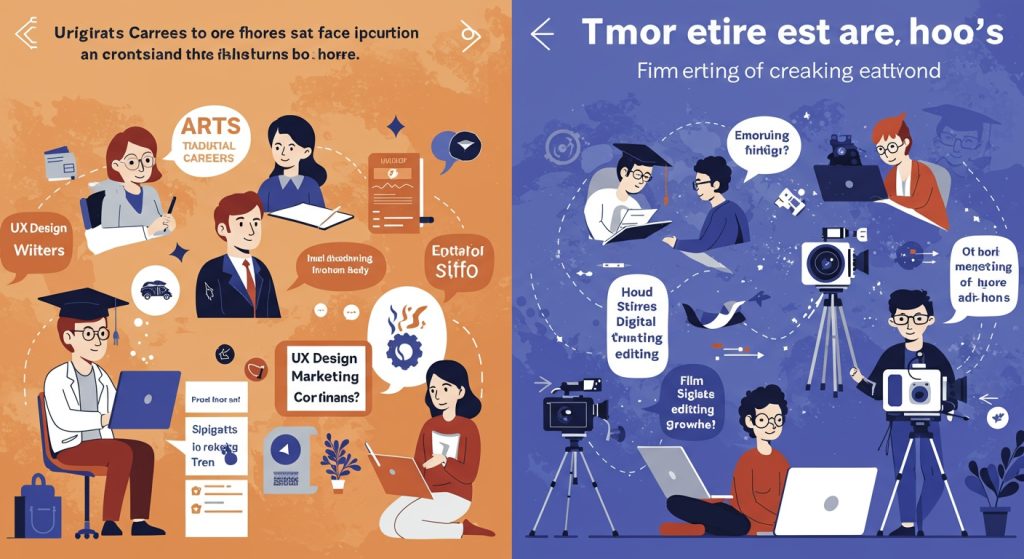Congratulations, you’ve earned your BSc in Computer Science! Now what? The tech landscape is a dynamic arena, demanding continuous adaptation. While your degree provides a solid foundation, navigating the myriad career paths—from specialized AI roles fueled by transformer models to securing cloud infrastructure against evolving cyber threats—requires strategic planning. We’ll explore options beyond traditional software development, diving into burgeoning fields like blockchain engineering and quantum computing, assessing required skills and potential career trajectories. Discover how to leverage your core CS knowledge to future-proof your career and thrive in this ever-changing industry.

Further Academic Pursuits: Deepening Your Expertise
A BSc in Computer Science provides a robust foundation. Specialization often becomes crucial in a competitive job market. Pursuing further education allows you to carve out a niche and become a sought-after expert. Here are some popular options:
- Master’s Degree (MSc): An MSc offers in-depth knowledge in a specific area of computer science, such as Artificial Intelligence, Data Science, Cybersecurity, or Software Engineering. It typically involves advanced coursework and a research-based thesis.
- MBA in Technology Management: For those interested in leadership roles, an MBA with a focus on technology management provides a blend of technical and business skills. This is ideal for managing tech teams, product development, or IT strategy.
- PhD: If you have a passion for research and innovation, a PhD allows you to conduct original research and contribute to the advancement of computer science. It’s a prerequisite for academic positions and research-intensive roles in industry.
Real-world example: Sarah, after completing her BSc in Computer Science, pursued an MSc in Data Science. Her thesis focused on developing machine learning algorithms for fraud detection in financial transactions. This specialization landed her a role as a Data Scientist at a leading fintech company, where she now leads a team building advanced fraud prevention systems.
Software Development: Crafting the Digital World
Software development remains a core career path for computer science graduates. This field involves designing, developing, testing. Deploying software applications. Here’s a breakdown of common roles:
- Front-End Developer: Focuses on the user interface (UI) and user experience (UX) of websites and applications. They use languages like HTML, CSS. JavaScript, along with frameworks like React, Angular. Vue. Js.
- Back-End Developer: Works on the server-side logic, databases. APIs that power applications. They use languages like Python, Java, Node. Js. Go.
- Full-Stack Developer: Possesses skills in both front-end and back-end development, allowing them to work on all aspects of a software application.
- Mobile App Developer: Creates applications for mobile devices using platforms like Android (Java, Kotlin) and iOS (Swift, Objective-C).
- DevOps Engineer: Automates and streamlines the software development lifecycle, focusing on continuous integration and continuous delivery (CI/CD). They use tools like Docker, Kubernetes. Jenkins.
# Example Python code for a simple API endpoint using Flask
from flask import Flask, jsonify app = Flask(__name__) @app. Route('/api/hello')
def hello_world(): return jsonify({'message': 'Hello, world!' }) if __name__ == '__main__': app. Run(debug=True)
Comparison: Front-End vs. Back-End Development
| Feature | Front-End Development | Back-End Development |
|---|---|---|
| Focus | User Interface and User Experience | Server-Side Logic and Databases |
| Languages | HTML, CSS, JavaScript, React, Angular, Vue. Js | Python, Java, Node. Js, Go, SQL |
| Tools | Browser Developer Tools, Code Editors, UI Design Software | Databases, Servers, APIs, Testing Frameworks |
| Key Skills | UI/UX Design, Responsive Design, JavaScript Frameworks | Database Management, Server Administration, API Design |
Data Science and Analytics: Unveiling Insights from Data
Data Science is a rapidly growing field that involves extracting knowledge and insights from data using statistical methods, machine learning algorithms. Data visualization techniques. Key roles include:
- Data Scientist: Develops and implements machine learning models, performs statistical analysis. Communicates findings to stakeholders.
- Data Analyst: Collects, cleans. Analyzes data to identify trends and patterns. They use tools like SQL, Python (with libraries like Pandas and NumPy). Data visualization software like Tableau or Power BI.
- Machine Learning Engineer: Builds and deploys machine learning models into production systems. They require strong programming skills and knowledge of cloud computing platforms.
- Business Intelligence (BI) Analyst: Creates dashboards and reports to track key performance indicators (KPIs) and provide insights for business decision-making.
Definition: Machine Learning
Machine learning is a subset of artificial intelligence (AI) that focuses on enabling computers to learn from data without being explicitly programmed. It involves developing algorithms that can identify patterns, make predictions. Improve their performance over time.
Real-world application: A retail company uses data science to review customer purchase history, website browsing behavior. Demographic data. This analysis allows them to personalize product recommendations, optimize pricing strategies. Improve marketing campaigns, leading to increased sales and customer loyalty.
Cybersecurity: Protecting Digital Assets
Cybersecurity is a critical field that focuses on protecting computer systems, networks. Data from unauthorized access, theft. Damage. Key roles include:
- Security Analyst: Monitors network traffic, analyzes security logs. Investigates security incidents.
- Penetration Tester (Ethical Hacker): Identifies vulnerabilities in computer systems and networks by simulating real-world attacks.
- Security Engineer: Designs, implements. Maintains security systems and infrastructure.
- Security Architect: Develops security policies, standards. Procedures to protect an organization’s assets.
Definition: Penetration Testing
Penetration testing, also known as ethical hacking, is the practice of simulating a cyberattack to identify vulnerabilities in a computer system, network, or web application. The goal is to find weaknesses before malicious actors can exploit them.
Real-world example: A bank hires a cybersecurity firm to conduct a penetration test on its online banking platform. The penetration testers identify a vulnerability that allows unauthorized access to customer accounts. The bank promptly fixes the vulnerability, preventing potential financial losses and reputational damage.
Cloud Computing: Powering the Future of IT
Cloud computing has revolutionized the IT industry by providing on-demand access to computing resources over the internet. Key roles in this field include:
- Cloud Architect: Designs and implements cloud-based solutions that meet an organization’s business requirements.
- Cloud Engineer: Deploys, manages. Maintains cloud infrastructure and services.
- DevOps Engineer (Cloud-Focused): Automates the deployment and management of applications in the cloud.
Key Technologies: AWS, Azure. Google Cloud
- Amazon Web Services (AWS): A comprehensive suite of cloud computing services offered by Amazon, including compute, storage, databases. Machine learning.
- Microsoft Azure: Microsoft’s cloud platform, offering a wide range of services for building, deploying. Managing applications.
- Google Cloud Platform (GCP): Google’s cloud platform, known for its strengths in data analytics, machine learning. Kubernetes.
Real-world application: A startup leverages AWS to host its web application and database. This allows them to scale their infrastructure quickly and easily as their user base grows, without the need to invest in expensive hardware.
Emerging Technologies: Staying Ahead of the Curve
The field of computer science is constantly evolving, with new technologies emerging all the time. Staying up-to-date with these trends is crucial for long-term career success. Some key areas to watch include:
- Artificial Intelligence (AI): Developing intelligent systems that can perform tasks that typically require human intelligence, such as image recognition, natural language processing. Decision-making.
- Blockchain: A decentralized, distributed ledger technology that enables secure and transparent transactions. Applications include cryptocurrencies, supply chain management. Digital identity.
- Internet of Things (IoT): Connecting everyday objects to the internet, enabling them to collect and exchange data. Applications include smart homes, smart cities. Industrial automation.
- Quantum Computing: A new paradigm of computing that leverages the principles of quantum mechanics to solve complex problems that are intractable for classical computers.
Definition: Blockchain
Blockchain is a distributed, decentralized, public ledger that is used to record transactions across many computers so that any involved record cannot be altered retroactively, without the alteration of all subsequent blocks. This allows the participants to verify and audit transactions independently and relatively inexpensively.
Entrepreneurship: Building Your Own Future
A BSc in Computer Science provides a solid foundation for launching your own tech startup. With strong technical skills and a creative mindset, you can develop innovative products and services that solve real-world problems. Key considerations for aspiring entrepreneurs include:
- Identifying a problem: Look for unmet needs or inefficiencies in the market.
- Developing a solution: Create a product or service that addresses the identified problem.
- Building a team: Surround yourself with talented and passionate individuals.
- Securing funding: Explore options like venture capital, angel investors, or bootstrapping.
Real-world example: Two computer science graduates identified a need for a better project management tool for software development teams. They built a prototype, secured seed funding. Launched their company. Their product quickly gained popularity. They eventually sold the company to a larger software firm.
The Importance of Career Guidance and Continuous Learning
Navigating the career landscape after a BSc in Computer Science can be overwhelming. Seeking career guidance from mentors, career counselors, or industry professionals can provide valuable insights and direction. Moreover, the field of computer science is constantly evolving, making continuous learning essential for staying competitive. This can involve:
- Online courses: Platforms like Coursera, edX. Udacity offer a wide range of courses in computer science and related fields.
- Certifications: Obtaining industry-recognized certifications can validate your skills and knowledge.
- Conferences and workshops: Attending industry events provides opportunities to learn about new technologies and network with other professionals.
- Personal Projects: Working on personal projects allows you to apply your skills and explore new technologies in a hands-on manner.
Conclusion
Let’s view your BSc in Computer Science not as an ending. As the launchpad for a thrilling journey. We’ve explored diverse pathways, from specializing in burgeoning fields like AI and cybersecurity to leveraging your coding skills in unexpected sectors. Remember that continuous learning is paramount. The tech landscape shifts rapidly, so actively seek opportunities to upskill – online courses, workshops. Even contributing to open-source projects will keep you ahead. Don’t be afraid to explore unconventional routes. I once met a computer science graduate who combined their coding expertise with their passion for music to create innovative audio software, carving a unique niche for themselves. Finally, network relentlessly! Attend industry events, connect with professionals on LinkedIn. Build relationships that can open doors you never imagined. Your future success hinges not only on your technical skills but also on your ability to adapt, learn. Connect. Go forth and code your own destiny!
More Articles
Top Computer Science Courses for AI and Machine Learning in 2025
Top 5 Computer Science Courses for Cybersecurity Professionals in 2025
Future Salary Trends: What Will Be the Highest Paying Jobs?
Best Material Science Courses: Focus on Sustainable Material Development for 2025
FAQs
So, I’m graduating with a BSc in Computer Science… Now what?! What are my options, realistically?
Congrats on graduating! Realistically, the world’s your oyster. You can jump straight into the workforce with roles like software developer, data analyst, web developer, or even QA tester. Or, you could pursue further studies like a Master’s degree to specialize. Another option? Bootcamps to hyper-focus on a specific skill like cybersecurity. It really depends on what sparks your interest.
I keep hearing about AI and Machine Learning. Is that a good path to take after a CS degree. What kind of jobs are we talking about?
Absolutely! AI and ML are booming. A CS degree provides a solid foundation. You could aim for roles like Machine Learning Engineer (building and deploying AI models), Data Scientist (analyzing data to derive insights), or even AI Researcher (pushing the boundaries of AI). Just be prepared to learn a lot about statistics and specialized programming languages like Python.
What if I’m not super into coding all day, every day? Are there other career paths for CS grads?
Definitely! Coding isn’t the only option. Think about project management (leading software development teams), UX/UI design (creating user-friendly interfaces), technical writing (explaining complex tech in plain English), or even sales engineering (selling technical products). Your CS background gives you a huge advantage in understanding the technology behind these roles.
Should I get a Master’s degree right away, or should I work for a bit first?
That’s the million-dollar question! There’s no single right answer. Working first gives you real-world experience and helps you figure out what you actually want to specialize in. A Master’s can open doors to higher-paying jobs and research-oriented roles. Consider your financial situation, career goals. Learning style when making the decision.
What are some ‘future-proof’ skills I should focus on developing, regardless of the specific job I choose?
Good question! Adaptability is key. Focus on learning new programming languages and frameworks quickly. Strong problem-solving skills are essential. Communication skills (both written and verbal) are crucial for collaborating with teams and explaining technical concepts to non-technical people. And don’t forget about continuous learning – the tech landscape is always evolving!
Okay, so what’s the deal with bootcamps? Are they worth it after already having a CS degree?
Bootcamps can be a great way to quickly acquire specific skills that are in high demand. If you want to become a web developer using a particular framework, or specialize in cybersecurity, a bootcamp can give you a focused, hands-on learning experience. Think of it as targeted training to boost your existing CS foundation.
Is it essential to have a portfolio of projects to show potential employers. What kind of projects should I include?
Absolutely! A portfolio is essential. It’s proof you can actually do things, not just grasp the theory. Include personal projects, contributions to open-source projects, or even school assignments that you’re proud of. Show variety! Include projects that demonstrate different skills (e. G. , web development, data analysis, mobile app development). Focus on quality over quantity.



